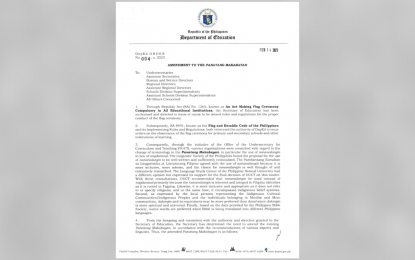
MORE INCLUSIVE. Vice President and Education Secretary Sara Duterte signs DepEd Order No. 4 dated Tuesday (Feb. 14, 2023), which amends a word in Panatang Makabayan. The DepEd said the amendment of "nagdarasal" to "nananalangin" is more inclusive and spiritual. (Photo courtesy of the Department of Education)
MANILA – The Department of Education (DepEd) on Wednesday said the term “nananalangin” is more inclusive and spiritual, as it approved the amendment of a single word in the country’s Panatang Makabayan.
In a text message, DepEd spokesperson Michael Poa said DepEd Order (DO) No. 4 was released following “consultations with linguistic societies and organizations.”
The DepEd pertains to the change of term used in the Panatang Makabayan phrase “Tutuparin ko ang tungkulin ng mamamayang makabayan, naglilingkod, nag-aaral, at nananalangin,” which was previously termed as nagdarasal.
“The consensus is that ‘nananalangin,’ as compared to ‘nagdarasal’ is more encompassing, inclusive, and spiritual. In a language, scan conducted, ‘galanin’ or ‘panalangin’ (prayer) is more commonly used across dialects. Even with our IP (indigenous people) communities, ‘dalangin’ is being used,” he told the Philippine News Agency.
Poa said “nananalangin” is a Filipino term, which encompasses IP groups and even religions.
“Dasal is rooted from Spanish which is usually intertwined with Catholicism. Dalangin, however, is rooted from Tagalog. Hence, the switch to dalangin is more Filipino and is more inclusive as it does not refer to particular religions,” he added.
“It is more inclusive and appropriate as it does not refer to specific religions, and at the same time, it encompasses indigenous belief systems. Second, as expressed by the focal persons representing the Indigenous Cultural Communities/Indigenous Peoples and the individuals belonging to Muslim and Moro communities, dalangin and its equivalents may be more preferred than dasal since dalangin is more spiritual and universal,” the DO 4 stated.
Among the experts consulted were the Linguistic Society of the Philippines, Pambansang Samahan sa Linggwistika at Literaturang Filipino and the Language Study Center of the Philippine Normal University, among others.
Apart from inclusivity, experts said the amended term is considered “well-written, sufficiently rationalized, more solemn and extensively researched.”
“Based on the data provided by the Philippine Bible Society, native words are preferred when the Bible is being translated into different Philippine languages,” it further indicated.
The DO 4 dated Feb. 14 is set to be implemented immediately, as signed by Vice President and Education Secretary Sara Duterte. (PNA)
